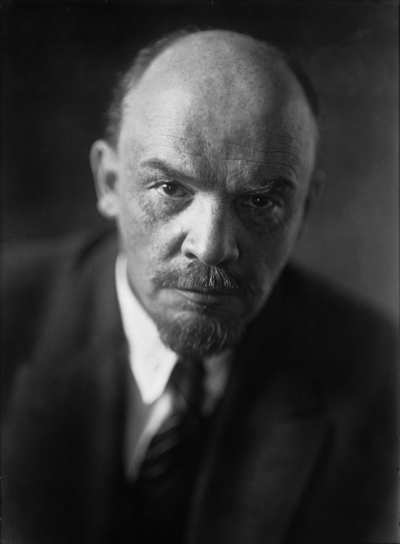The Moscow Kremlin Wall is a defensive wall that surrounds the Moscow Kremlin, recognisable by the characteristic notches and its Kremlin towers. The original walls were likely a simple wooden fence with guard towers built in 1156.
The Kremlin walls, like many cathedrals in the Kremlin, were built by Italian architects.
Vladimir Ilyich Ulyanov (22 April [O.S. 10 April] 1870 – 21 January 1924), better known by his alias Lenin, was a Russian revolutionary, politician, and political theorist. He served as the first and founding head of government of Soviet Russia from 1917 to 1924 and of the Soviet Union from 1922 to 1924. Under his administration, Russia, and later the Soviet Union, became a one-party socialist state governed by the Communist Party. Ideologically a Marxist, he developed a subset of Marxism called Leninism.
Born to an upper middle-class family in Simbirsk, Lenin embraced revolutionary socialist politics following his brother's 1887 execution. Expelled from Kazan Imperial University for participating in protests against the Russian Empire's Tsarist government, he devoted the following years to a law degree. He moved to Saint Petersburg in 1893 and became a senior Marxist activist. In 1897, he was arrested for sedition and exiled to Shushenskoye in Siberia for three years, where he married Nadezhda Krupskaya. After his exile, he moved to Western Europe, where he became a prominent theorist in the Marxist Russian Social Democratic Labour Party (RSDLP). In 1903, he took a key role in the RSDLP ideological split, leading the Bolshevik faction against Julius Martov's Mensheviks. Following Russia's failed Revolution of 1905, he campaigned for the First World War to be transformed into a Europe-wide proletarian revolution, which, as a Marxist, he believed would cause the overthrow of capitalism and its replacement with socialism. After the 1917 February Revolution ousted the Tsar and established a Provisional Government, he returned to Russia to play a leading role in the October Revolution in which the Bolsheviks overthrew the new regime.
Lenin's Bolshevik government initially shared power with the Left Socialist Revolutionaries, elected soviets, and a multi-party Constituent Assembly, although by 1918 it had centralised power in the new Communist Party. Lenin's administration redistributed land among the peasantry and nationalised banks and large-scale industry. It withdrew from the First World War by signing a treaty conceding territory to the Central Powers, and promoted world revolution through the Communist International. Opponents were suppressed in the Red Terror, a violent campaign administered by the state security services; tens of thousands were killed or interned in concentration camps. His administration defeated right and left-wing anti-Bolshevik armies in the Russian Civil War from 1917 to 1922 and oversaw the Polish–Soviet War of 1919–1921. Responding to wartime devastation, famine, and popular uprisings, in 1921 Lenin encouraged economic growth through the New Economic Policy. Several non-Russian nations had secured independence from the Russian Empire after 1917, but three were re-united into the new Soviet Union in 1922. His health failing, Lenin died in Gorki, with Joseph Stalin succeeding him as the pre-eminent figure in the Soviet government.
Widely considered one of the most significant and influential figures of the 20th century, Lenin was the posthumous subject of a pervasive personality cult within the Soviet Union until its dissolution in 1991. He became an ideological figurehead behind Marxism–Leninism and a prominent influence over the international communist movement. A controversial and highly divisive historical figure, Lenin is viewed by his supporters as a champion of socialism and the working class. Meanwhile Lenin's critics accuse him of establishing a totalitarian dictatorship which oversaw mass killings and political repression.

1961Oct, 30
Due to "violations of Vladimir Lenin's precepts", it is decreed that Stalin's body be removed from its place of honour inside Lenin's tomb and buried near the Kremlin Wall with a plain granite marker instead.
Choose Another Date
Events on 1961
- 8Jan
Charles de Gaulle
In France a referendum supports Charles de Gaulle's policies in Algeria. - 16Apr
Fidel Castro
In a nationally broadcast speech, Cuban leader Fidel Castro declares that he is a Marxist-Leninist and that Cuba is going to adopt Communism. - 1May
Fidel Castro
The Prime Minister of Cuba, Fidel Castro, proclaims Cuba a socialist nation and abolishes elections. - 25Jul
NATO
In a speech John F. Kennedy emphasizes that any attack on Berlin is an attack on NATO. - 10Aug
Agent Orange
First use in Vietnam War of the Agent Orange by the U.S. Army.

 English
English  español
español  français
français  português
português  русский
русский  العربية
العربية  简体中文
简体中文 